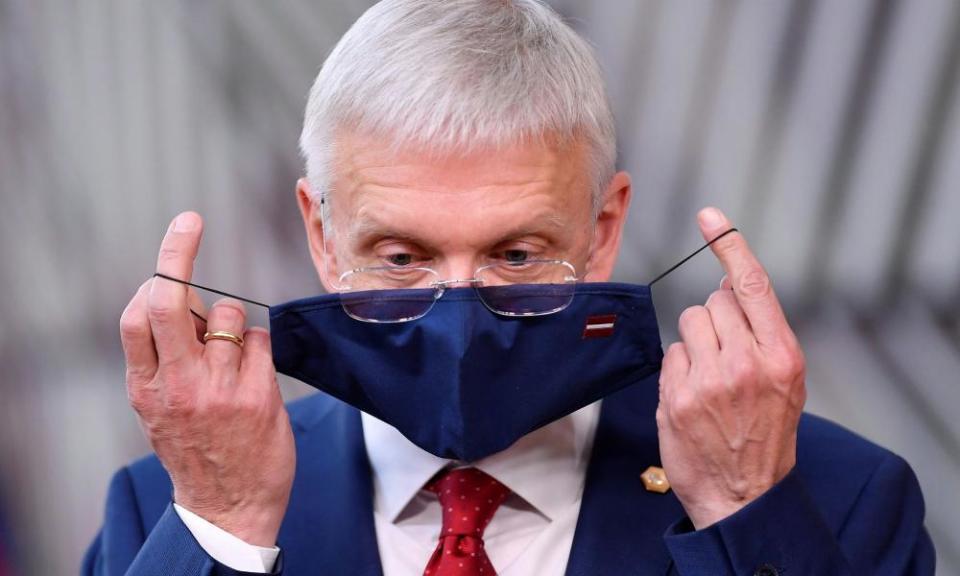Latvia is first country to reimpose lockdown in Europe’s new Covid wave

Latvia has announced a month-long Covid-19 lockdown after an unprecedented surge in infections, becoming the first country in Europe to reimpose far-reaching restrictions as countries across the continent suffer a new wave of cases.
The Baltic country has one of the highest rates of new Covid cases per capita in the world, according to the US Centres for Disease Control and Prevention (CDC), after successfully keeping the virus at bay for months.
“Our health system is in danger … The only way out of this crisis is to get vaccinated,” the prime minister, Krišjānis Kariņš, said on Monday evening at an emergency government meeting, saying the country’s low vaccination rate was to blame for the surge in hospitalisations.
Only 57% of the 1.9 million Latvians are fully vaccinated, well below the EU average of 74%, as the government this week imposed a month-long night-time curfew, from 8pm to 5am, and closed schools and all non-essential stores.
“I have to apologise to the already vaccinated,” Kariņš said, adding that only essential manufacturing, construction and critical jobs would be allowed to continue in person.
default
Last week, the Latvian president, Egils Levits, tested positive for coronavirus, forcing Finland’s president, Sauli Niinistö, who had met Levits a day earlier, to self-isolate.
Latvia was for a long time viewed as one of Europe’s lone coronavirus success stories, recording fewer than 3,000 Covid deaths since the start of the pandemic.
But critics say a sluggish and uneven vaccination rate has led to the rise in infections.
Ilze Viņķele, Latvia’s former health minister who oversaw the country’s first two coronavirus waves, said: “We knew that certain groups, especially older citizens as well as those from less affluent socioeconomic backgrounds, were sceptical to take the vaccine. But unfortunately we have not been able to address this divide effectively.
“Now we are forced to go into a lockdown, and those Latvians who actually got vaccinated will feel frustrated as they have been playing by the rules all along.”
Viņķele added that vaccination uptake in Latvia varied geographically, with some portions of the country recording a vaccination rate of less than 25%.
Daniels Pavļuts, the country’s health minister, has previously blamed “disinformation” about vaccines in Russian-language media for vaccine scepticism among Latvia’s large Russian-speaking population.
Latvia is the first country in Europe to reimpose a strict lockdown as a fresh Covid wave gathers pace across the continent, hitting countries with low vaccination rates, especially those in central and eastern Europe, where vaccine scepticism is high.
default
Romania and Ukraine have recorded a surge of new infections and Covid deaths as the countries struggle to convince their populations to get vaccinated.
Russia, which has been reporting record daily deaths and has a vaccination rate dramatically below the EU’s with only a third of its population jabbed, announced a new set of restrictions on Tuesday, ordering unvaccinated citizens aged over 60 to stay home for four months as well as introducing vaccine passports in several regions.
Russia has so far rejected a nationwide lockdown, citing economic concerns, and restaurants, bars and theatres in the capital remain open. Moscow instead announced on Tuesday plans to reintroduce remote work as well as mandatory vaccinations for service workers to slow the surging fourth wave of the coronavirus.
But with colder weather and few restrictions, the virus also looks to be regaining strength in heavily vaccinated countries such as the UK and the Netherlands. New coronavirus infections in the Netherlandsrose 44% over the last week as several of its hospitals announced they would cut back on regular care to deal with a growing number of hospitalisations among the unvaccinated.

 Yahoo Finance
Yahoo Finance 